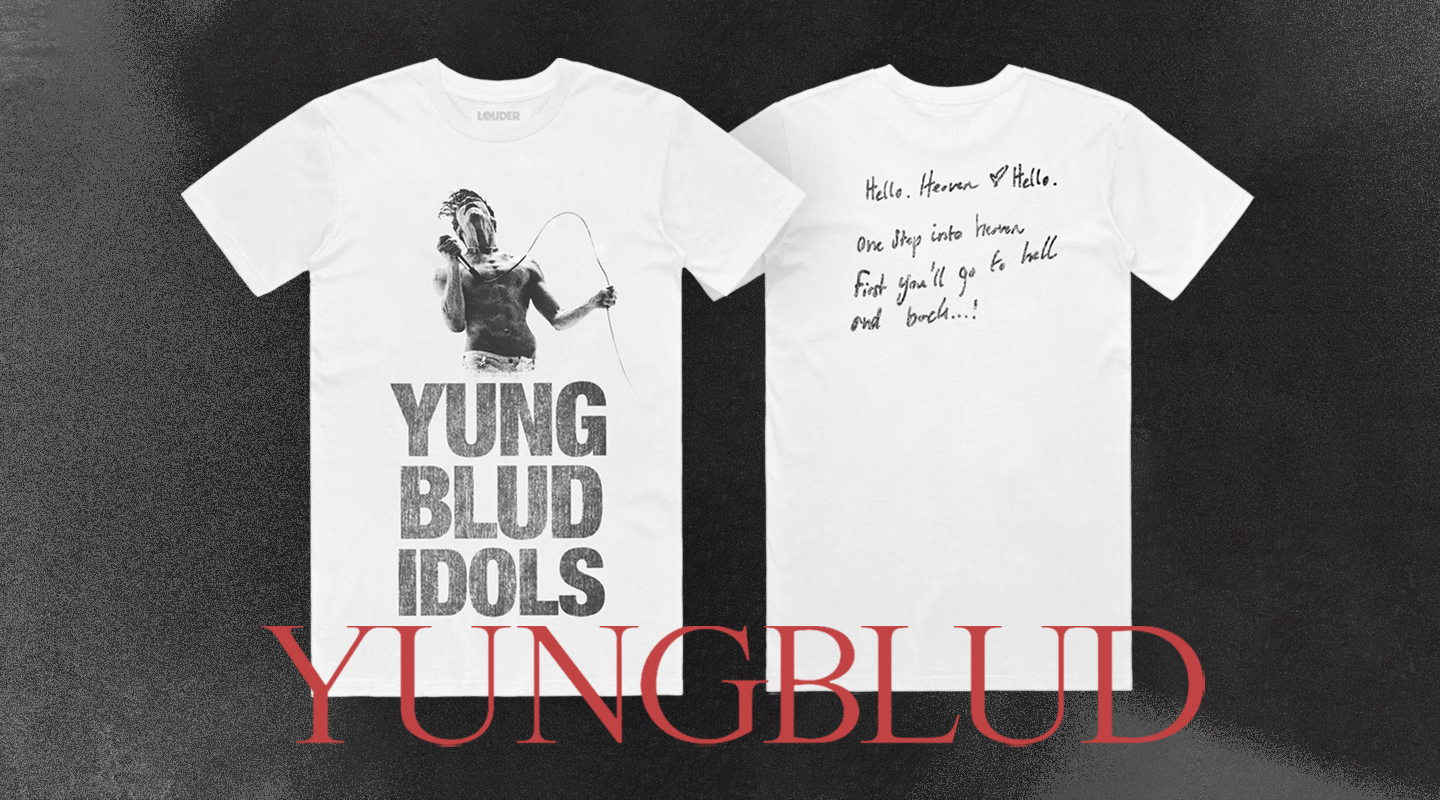Best budget turntables 2025: Ace, accessible record players that’ll spin your vinyl for head-turningly cheap
You really don't have to spend a fortune to get yourself an excellent record player - here are my top 6 picks that offer awesome audio at an affordable price
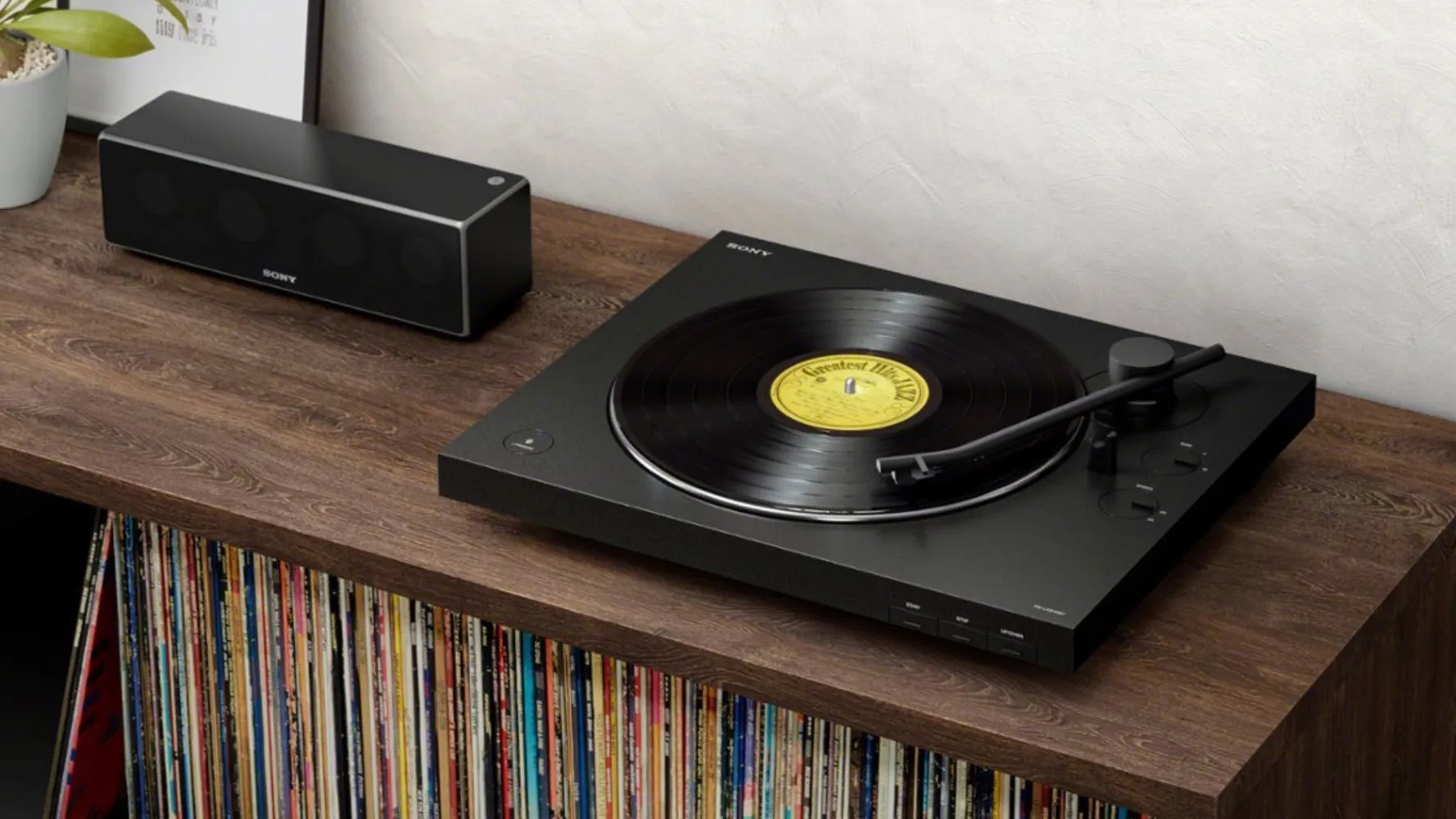
Vinyl is, in a word, fun. If I were to venture two words, they’d be “hugely fun”. The tactile experience of playing a record is something special, that puts your music at your fingertips in a way no streaming service ever truly could. You get a sense of ownership over both your collection and your listening experience – a sense of ownership which makes picking the right record player a particularly personal prospect.
While collecting vinyl isn’t the cheapest of hobbies, record players aren’t all rarefied, expensive items of listening luxury. The budget end of the record player market is actually extremely competitive, with many well-loved brands vying for supremacy through development of affordable, high-quality wax-spinning fare.
If you’re new to turntables and records, if you’re looking for a cheap upgrade from a life of digital listening, or if you’re simply looking for a friend, you’ll probably find the budget turntable you’re after among the following reviews. I’ve picked out six stellar record players at the cheaper end of the price spectrum, ranging from automatic, Bluetooth-enabled turntables to upgradeable record players that’ll play your Alice Cooper records for decades to come.
But if you want to get straight into the action, then my no.1 pick is the Sony PS-LX310BT. In my opinion, this sleek-looking automatic turntable delivers punchy audio, is Bluetooth-enabled and has everything you could want from the budget turntable.
If you’re feeling a little decision paralysis, I’ve also put together some key tips on how to choose your budget turntable – and for more clarity, you’ll find some frequently asked questions beyond! Otherwise, simply read on to find out what my favourite budget turntables on the market right now are.
The quick list
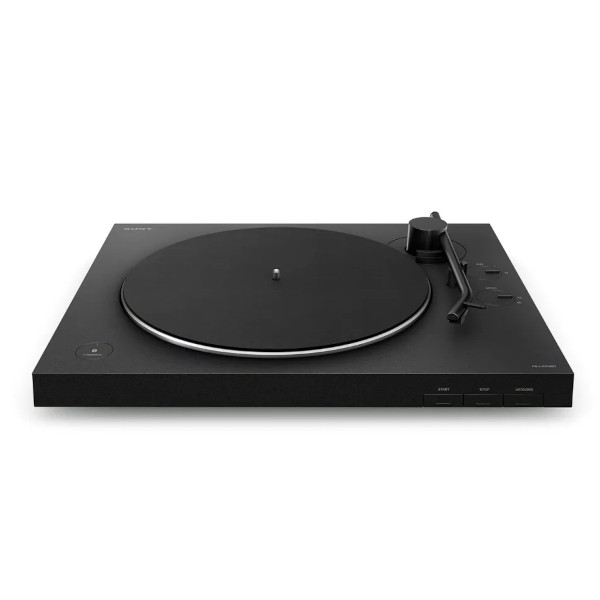
After full testing, the Sony PS-LX310BT leads the pack as my pick of the best budget turntable overall. This automatic, belt-driven record player has two speed settings, a built-in phono stage, plus Bluetooth tech for connecting to wireless speakers or headphones. I think the sound quality is awesome for the price - something you would expect from Sony - and the classic stealth styling looks great.
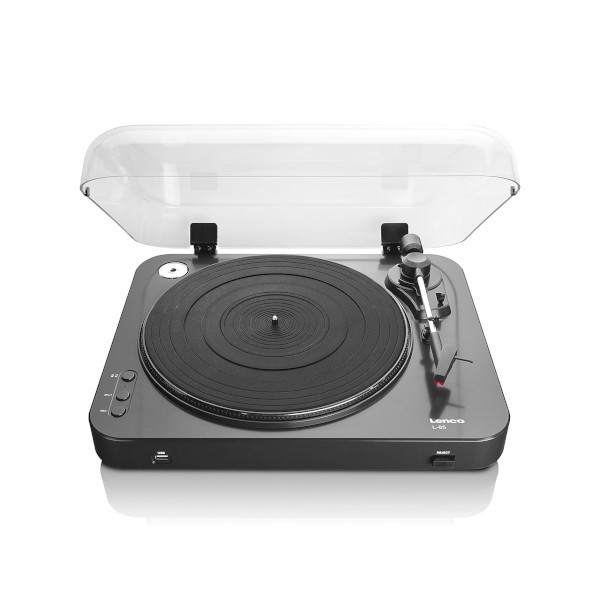
If you're just getting started on your vinyl journey, the Lenco L-85 turntable is a fantastic record player for first-timers. It might look a little basic, but it's belt-driven, offers two speeds and has a moving magnet cartridge which is more than enough to get you started. The L-85 also boasts a built-in phono stage. Overall I can't fault the sound for the price and it's easy to get up and running too.
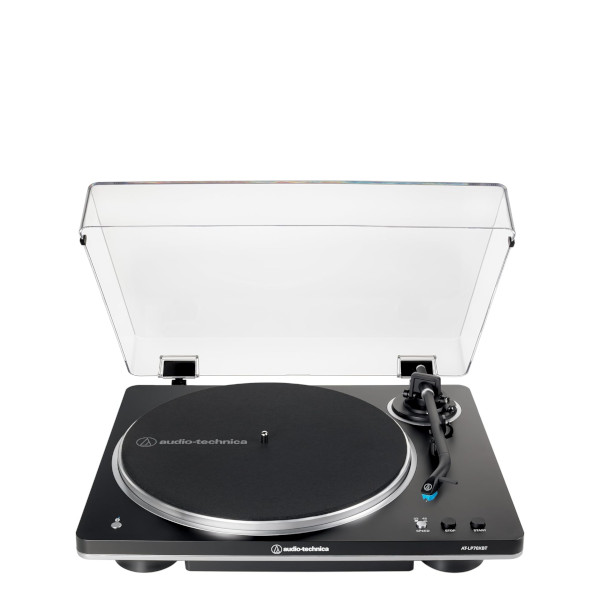
The Audio-Technica AT-LP70XBT is an excellent automatic turntable, and one which readily trounces the vast majority of other automatic turntables in the budget price range. Solid playback, great sound and sleek looks all add up to make this a cool low-cost customer.
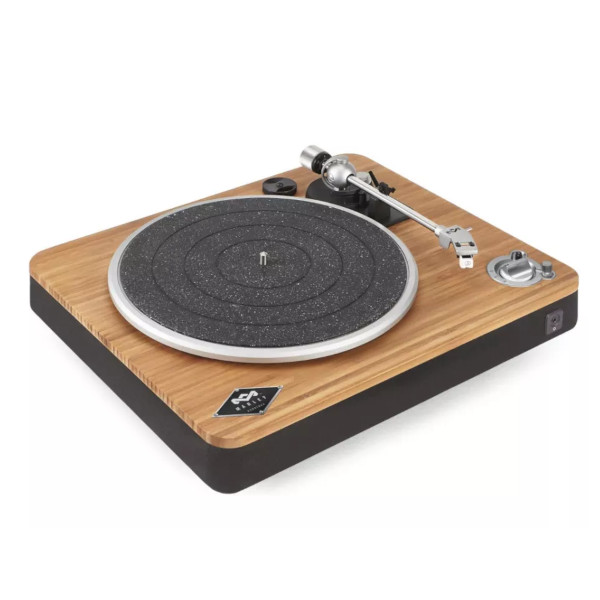
House Of Marley's Stir It Up budget Bluetooth turntable is a great-looking unit made from bamboo and recycled materials. It also has a phono stage built-in and converts vinyl to digital. We scored it highly for sound quality during testing, though some distortion was detected at higher volumes. Overall, this is a great cheap record player but keep a duster handy as there's no hard cover.
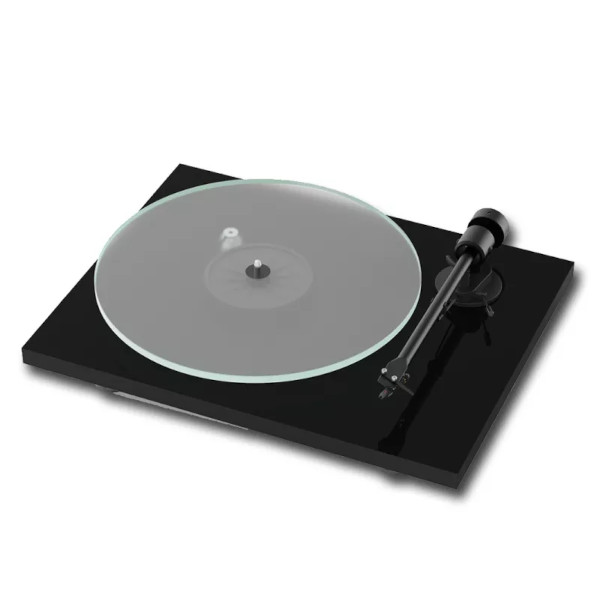
If you like big bass, the Pro-Ject T1 is the best budget turntable for you. Our reviewer loved the weighty sound during testing, but also noted that the sound isn't exactly neutral, so you may lose some detail. The T1 is belt-driven, operates at two speeds and in my opinion is one of the sleekest looking decks in this guide. Although there's no USB recording, Bluetooth connectivity or phono pre-amp, if bass is your jam and you have a small budget, then the Pro-Ject T1 is ideal.
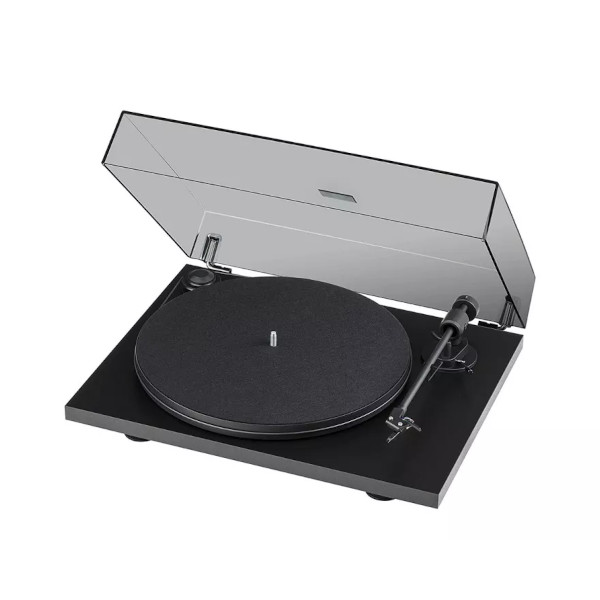
When Louder tested this belt-driven, two-speed turntable, we found that it offered a rounded, well-balanced sound. However, it doesn't feature a phono pre-amp and you can't rip your vinyl to digital – you'll find those elsewhere, but be prepared to spend a little more if that's the case. Otherwise, the Pro-Ject Primary E is a great no-nonsense budget turntable from a well trusted audio brand.
Best overall
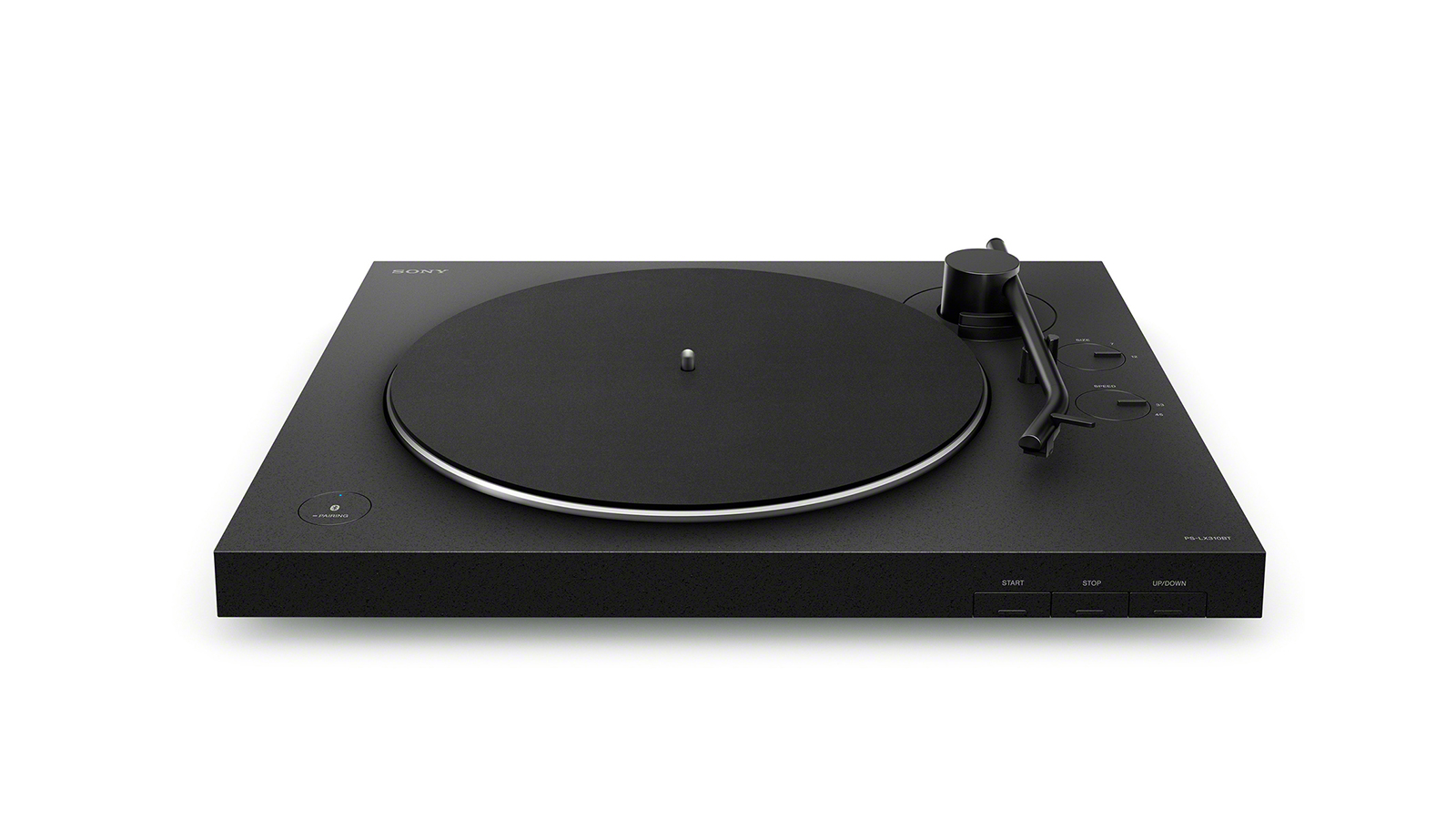
Specifications
Reasons to buy
Reasons to avoid
✅ Buy if you want quality at a great price: If you’re after a fully automatic turntable from one of the big brands at an affordable price, look no further.
❌ Avoid if you’re after a more detailed unit: The Sony PS-LX310BT is a top choice for those on a budget, but you’ll find better if your budget stretches a little further.
Sound ★★★★½
Design ★★★★★
Features ★★★★★
Overall ★★★★★
If you’re looking to marry old-school hi-fi with new-school cool, the Sony PS-LX310BT is the turntable for you and is my top choice when it comes to the best budget turntables. The big draw here is Bluetooth support, which you can use to send that rich, analogue audio via the digital, wireless domain to a pair of Bluetooth headphones or a wireless speaker. No wires required, so less clutter around your living room.
On top of that the tonearm action on this Sony turntable is automatic, so the needle will find your record’s groove via a button-press and will extricate itself at the end with no intervention necessary.
Crucially, the Sony PS-LX310BT also sounds fantastic. I found it to be detailed, punchy and direct. This is a deck that reveals the details lurking in the depths of those black disks and brings them to the surface in fun, bubbly fashion.

"Considering its price, the Sony PS-LX310BT ticks a lot of boxes. It's easy to operate, it sounds great and with Bluetooth connectivity, you can beam your music straight to your wireless speaker set-up. For a turntable in this price bracket, it comes highly recommended."
Read more: Sony PS-LX310BT review
Best for beginners
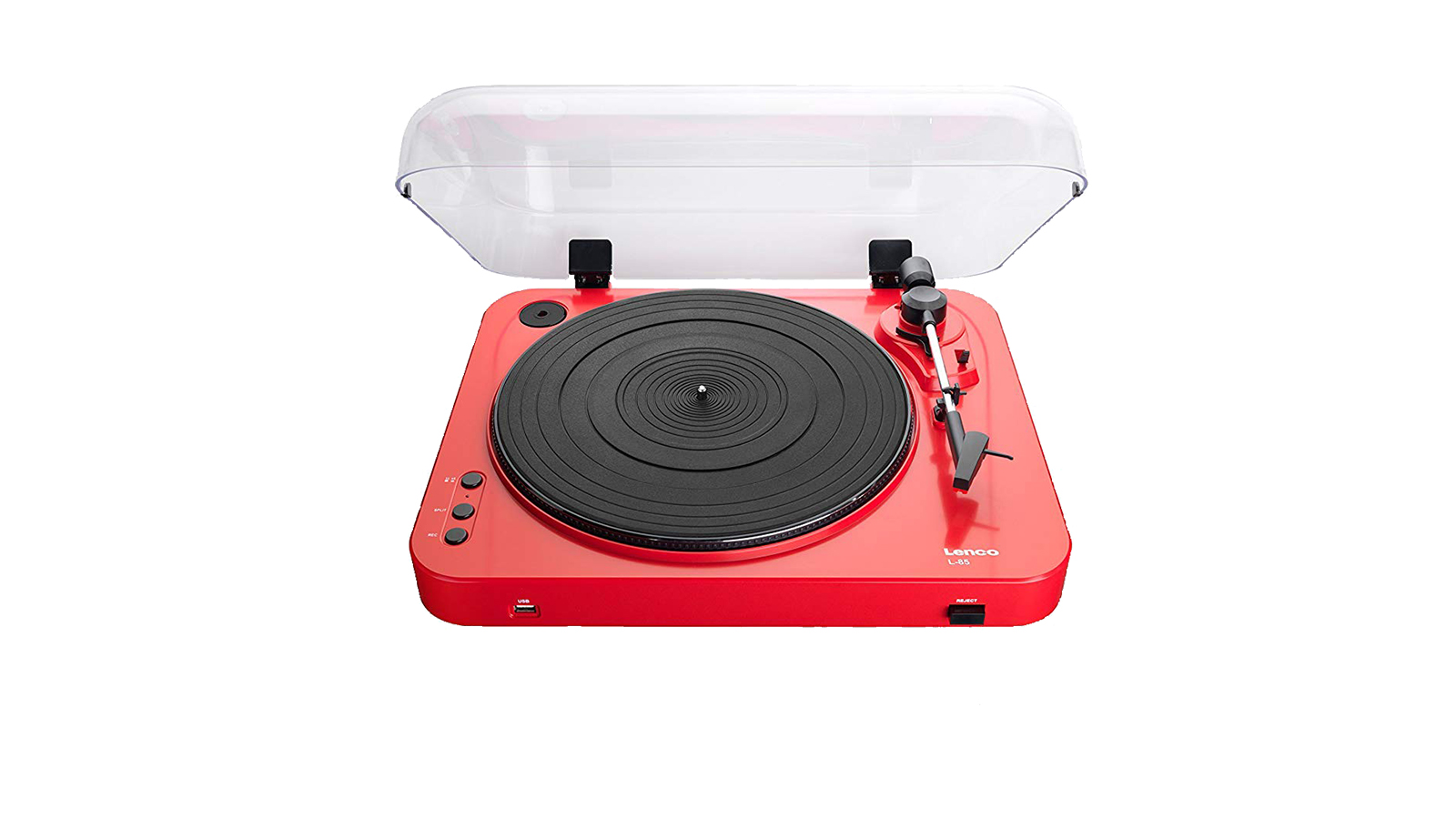
Specifications
Reasons to buy
Reasons to avoid
✅ Buy if you’re buying your first turntable: The Lenco L-85 is perfect if you want a no-nonsense, plug-and-play turntable.
❌ Avoid if you want a sleek-looking bit of kit: This model doesn’t exactly scream premium-level tech, so check out other options if you’re in the market for a more designer look.
Sound ★★★★
Design ★★★★
Features ★★★
Overall ★★★★
It might look a little like a children's toy – and let's be honest, it's almost as cheap – but the Lenco L-85 is actually a semi-automatic, brilliant belt-driven turntable with a built-in phono stage. And as if that wasn't enough, it also has the ability to record via USB. It really is as plug-and-play as a record player gets.
It carries some old school aesthetic – it comes with a pair of RCA cables so you can plug the L-85 turntable into your stereo amplifier and get started straight away – but its also has more modern touches too, with the USB port allowing to convert your vinyl into MP3 files for your personal archive.
I really do think this is a great starting point for anyone who's just getting into vinyl or those who have discovered their old record stash while clearing out their attic or garage.

"Great features and user-friendly operation make this Lenco the best budget plug-and-play turntable I've come across."
Read more: Lenco L-85 review
Best automatic
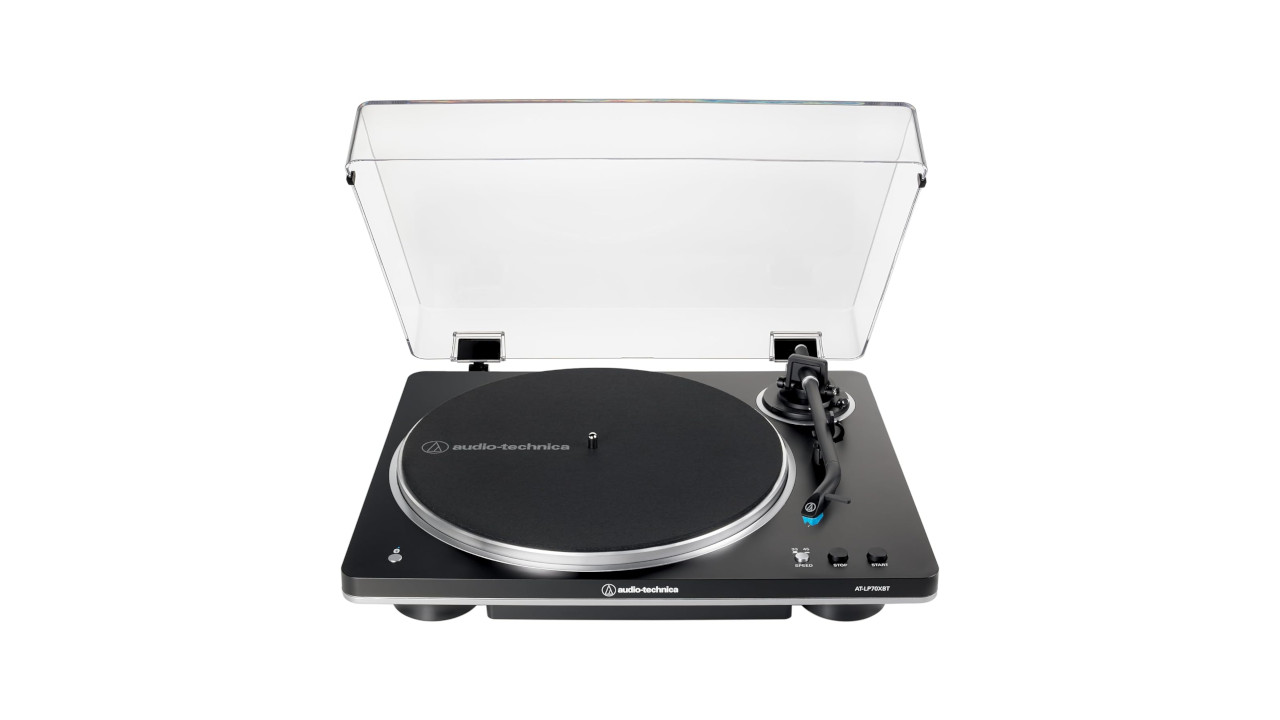
Specifications
Reasons to buy
Reasons to avoid
✅ Buy if you want a solid turntable with Bluetooth: The Audio-Technica AT-LP3 previously held no.3 in my list, but that didn't feature Bluetooth. This does and is a more fully-fledged all round record player.
❌ Avoid if you want top of the range build quality: The Audio-Technica’s AT-LP0XBT is a rock solid option, but it's quite lightweight compared to some other turntables.
Sound ★★★★★
Design ★★★★★
Features ★★★★
Overall ★★★★½
Audio-Technica’s AT-LP0XBT is a stunning re-iteration of the brand’s entry-level turntable-making nous, combining aspects from popular automatic and budget-level Audio-Technica record players past. This is, by name, the successor unit to the longstanding budget favourite, the LP60XBT, though it also bears some incidental similarities to the LP3 (which previously held this very spot in my round-up).
The AT70XBT brings a swankier-looking chassis, with some design choices that make accessing the turntable’s various features much easier. The key upgrade, though, is in the tonearm. Gone is the flimsy, cheap-feeling tonearm of the LP60XBT (and clones of which you find on every briefcase player you’ve rightfully chosen not to buy), replaced by a precisely-counterweighted J-shape tonearm with a built-in AT-VM95 cartridge. Not only does this provide a more robust sound, but it also allows you to upgrade the stylus with any from Audio-Technica’s AT-VMN95 range.
Upgradeability isn’t usually on the cards for beginner-friendly plug-and-play turntables like this one – but here it is, on a stable-playing turntable that looks and sounds better than many of its contemporaries. It’s a little pricier for it, but it’s a price worth paying in my view.
Best eco-friendly budget turntable
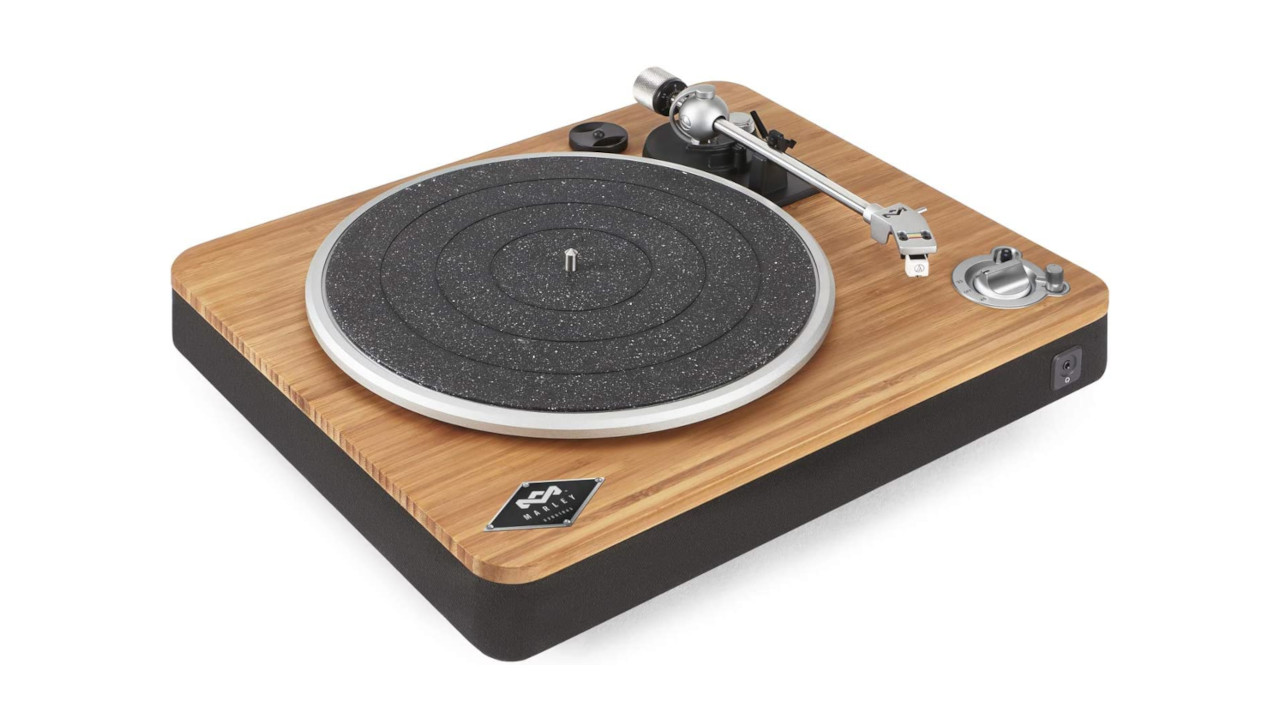
Specifications
Reasons to buy
Reasons to avoid
✅ Buy if you want a greener turntable: All House Of Marley’s products are made with reclaimed and recycled materials and finished with sustainable bamboo.
❌ Avoid if you’re after a hard cover: We like protecting our vinyl when they’re spinning, but unfortunately, the Stir It Up has no hard-shell cover.
Sound ★★★★½
Design ★★★★★
Features ★★★★
Overall ★★★★½
House Of Marley’s distinctive audio gear comprises speakers, headphones and, of course, turntables - all finished with sustainably crafted bamboo. Not only that, but their products also utilise reclaimed organic cotton, reclaimed hemp and recycled plastic. This is great to see, and fortunately, their Stir It Up turntable is a great-sounding product too and available for a really good price.
This double-speed turntable has a built-in pre-amp which can be switched on and off - and it can connect wirelessly to Bluetooth speakers, so you won’t have to shell out more money if you already have one or two in your home. There’s also a headphone jack which is something I thought was a great idea in a record player.
Another plus is the fact you can rip your vinyl to digital using your PC or Mac, adding another positive for the House Of Marley Stir It Up turntable.

"Gorgeous, environmentally friendly, sonically balanced... buy this affordable tribute to the Jamaican reggae legend and every little thing's gonna be alright."
Read more: House Of Marley Stir it Up review
Best for deep bass
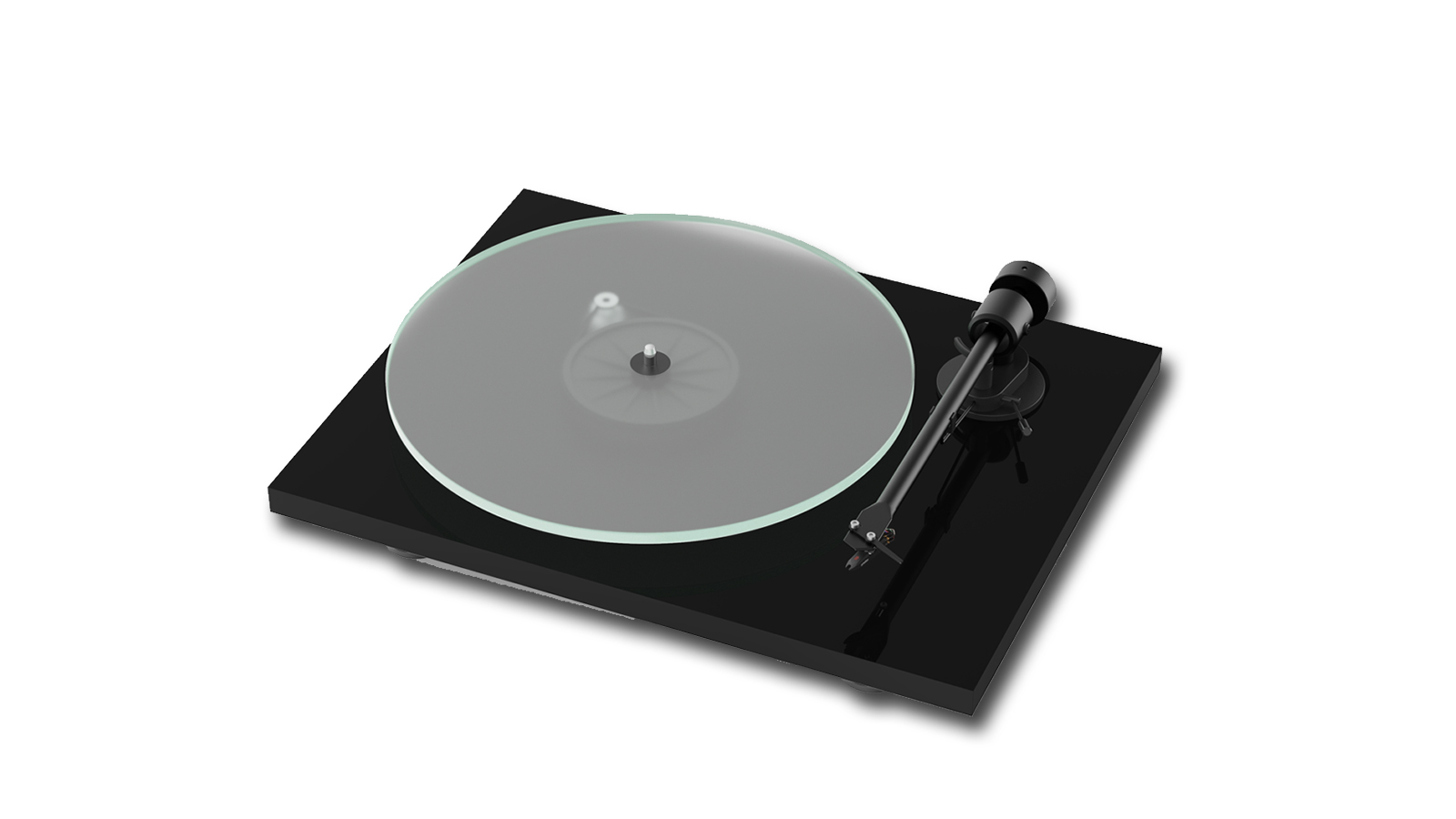
Specifications
Reasons to buy
Reasons to avoid
✅ Buy if you want deep bass: Big bass isn’t for everyone, but for those who can’t get enough, the Project T1 has a weighty bass that’s hard to ignore.
❌ Avoid if you want a more neutral sound: The bass on this thing is hard to ignore, so look elsewhere if you’re after more balance.
Sound ★★★★½
Design ★★★★★
Features ★★★★
Overall ★★★★½
If you’re keen that your affordable turntable has a premium look and feel, the excellent Pro-ject T1 could be the one for you. This entirely plastic-free deck is brilliantly solid and weighty, and it comes more or less ready to rock – you need only place the platter and belt yourself and you're away.
The Pro-ject T1 record player is light on fancy features – there’s no Bluetooth or USB recording, and you’ll need to add a phono preamp, but that’s because sound quality has been prioritised.
While there are other turntables are more suited to clarity and detail, don't forget about the Pro-ject T1 counters with a smoother, weightier, bass-heavy sound that'll suit a lot of the rock and metal vinyl you’ll be spinning.

"Both in terms of build and sound, the T1 is of a noticeably higher quality than many entry-level turntables – and its price reflects that. However, a lack of adjustability and a slightly congested sound at the bottom end may well frustrate true audiophiles."
Read more: Pro-Ject T1 review
Best sound balance
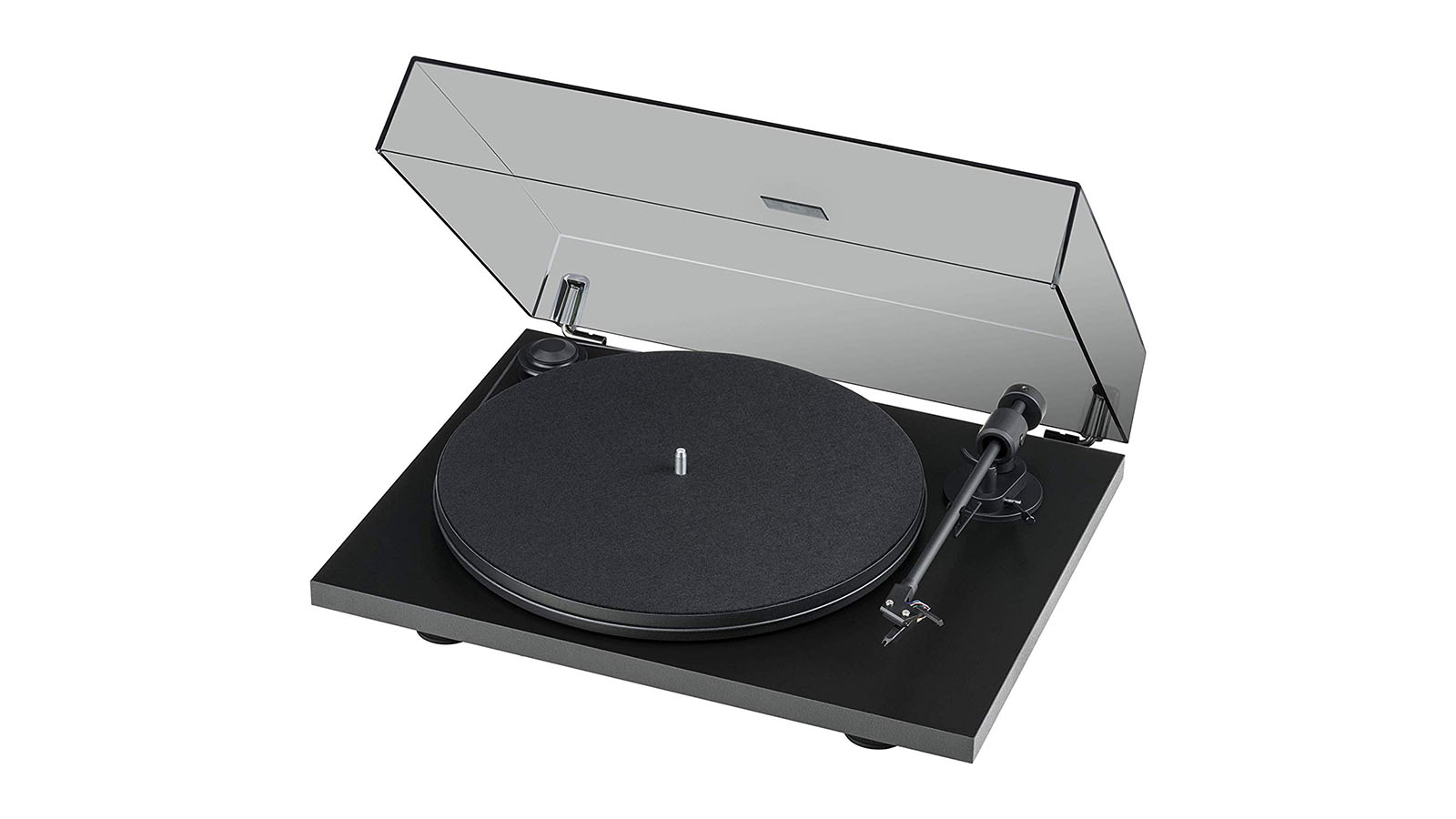
Specifications
Reasons to buy
Reasons to avoid
✅ Buy if you’re want a rugged record player: There’s no bells and whistles here, but what you do get is a well-built turntable with decent sound and performance.
❌ Avoid if you want extra features: Look elsewhere for Bluetooth & automatic functionality - and there’s no preamp.
Sound ★★★★½
Design ★★★★★
Features ★★★★
Overall ★★★★½
While the Pro-Ject Primary E is pretty much a basic deck at heart, don't dismiss it out of hand, as I think this belt-driven turntable does the job incredibly well.
The initial set-up is a breeze, and I found everything I played on it - from Led Zeppelin to Rush - sounded well-balanced and crystal clear with enough body to do the bottom end justice.
If you’re looking for your first turntable, not only would this look great as part of your setup, but it sounds well above average. It's also rugged and built to last, won’t cost you the earth. It comes highly recommended if you're looking for a quality record player on a budget.

"The Pro-Ject Primary E turntable does the basics very well – which is not something you can say about a lot of record players costing this price. Looks-wise, it's a bit on the minimalist side, but if you're after a great-sounding turntable for very little cost, this is a great choice."
Read more: Pro-Ject Primary E review
Glossary of terms
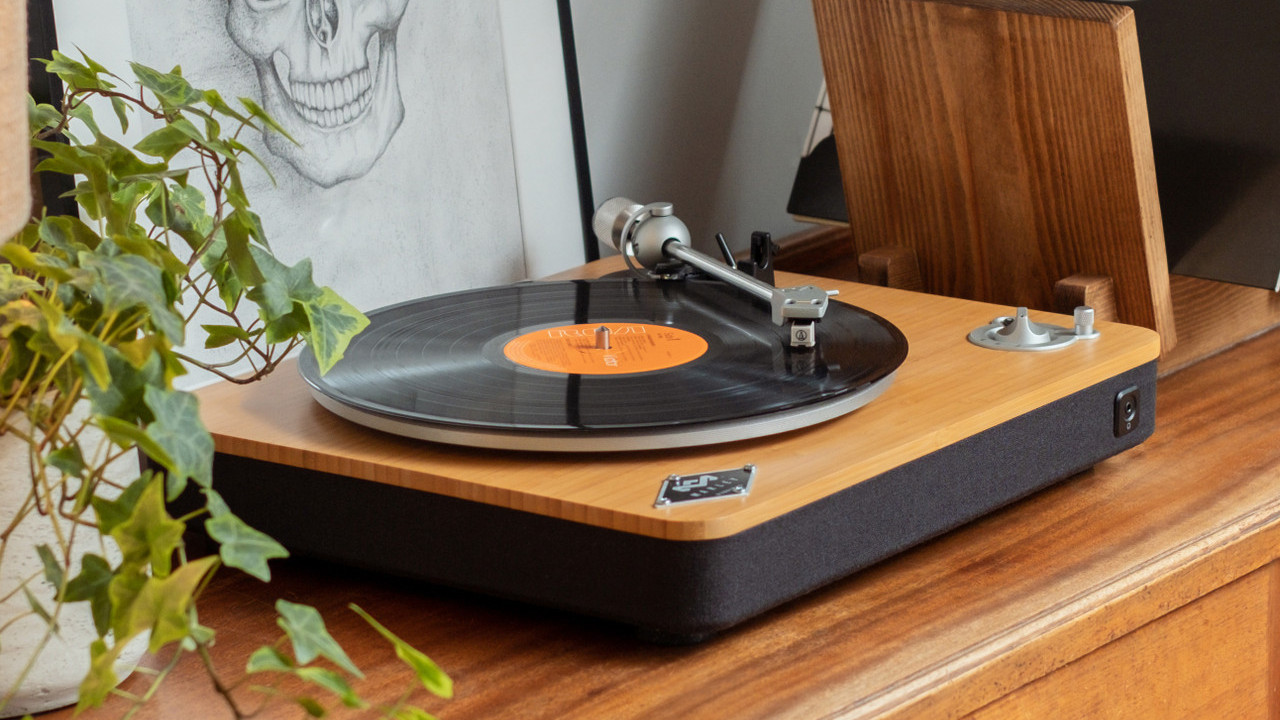
Buying your first turntable often begets questions you’re not yet equipped to answer – like “what on earth am I looking at?” or “how do I know this isn’t a tinny pile of rubbish?” Even though budget turntables aren’t so hard on the wallet, you’re still investing your hard-earned – and deserve something that will deliver what you want and more. So, what do you want? Use the following terms to help guide you to a great purchase.
Build quality: Build quality is a given for any considered purchase, and barely constitutes mentioning here. Still, you can expect there to be a pretty clear correlation between price and build quality – and if something feels a bit out of line with respect to that correlation, it’s not worth your time. Under $/£100 and you can expect flimsy plastics, but towards $/£200 and you can expect a bit more robustness.
Drive type: Belt-drive turntables are the norm at the entry level, and tend to benefit from a quieter sound; the belt acts a bit like a shock absorber between the motor and the platter, so less ‘noise’ is transmitted to the cartridge. Direct-drive turntables cut out the belt-y middleman, and tend to be a little sharper and more robust for it; however, at the cheaper end of the spectrum, these can be noisy. I’d advise belt-drive, unless you’ve got DJing aspirations.
For further reading, check out our direct-drive vs belt-drive turntables feature.
Tonearm & cartridge: This is the part that actually conveys audio from the record to the rest of your setup, and probably has the most direct impact on the quality you can expect from a given turntable. The cartridge is the audio-translating part, and a key part to look at when deciding between turntables.
Try avoiding turntables with permanently-attached or no-name cartridges. Most budget turntables worth their salt will have at least an Audio-Technica cartridge attached, if not an entry-level Ortofon; these are safe bets, to say the least (especially if the tonearm ends with a 1/2” headshell, or the Audio-Technica cartridge is part of the upgradeable VM series!).
A good tonearm, meanwhile, is a well-balanced one; while it would be preferable to adjust a tonearm’s counterweighting yourself, some budget turntables have pre-weighted tonearms that are specced perfectly for their accompanying cartridge. Anti-skate controls are a bonus, too.
Built-in preamp: Phono preamps are a necessary element to any vinyl hi-fi system, as an additional stage of amplification for the minute signal produced by the cartridge. Most budget record players have a phono pre-amp built-in, saving you extra outlay on hi-fi separates and making the whole turntable more compatible with beginner systems. If you want more control over your sound, though, maybe go for a turntable with a switchable preamp, and look into buying your own.
Other topics to consider
You can trust Louder
Sound: Sound is the most subjective criteria of them all, and something only you can really comment on with regard to your own wants. Sound is determined by a combination of all the above, as well as the presence or absence of certain mod-cons in your turntables-of-choice.
Again, there’s something of a correlation between price and sound, but not as steep a correlation as you might think. There are especially cheap turntables on this list that go toe-to-toe with units twice, even three times their price. If you want your best shot at heft, hoof and dynamic gut-punchery, I’d suggest you go for a solidly-built budget turntable with a levelled-up cartridge – the cartridge often being a real bottleneck for audio quality at the entry level.
Extra features: How keen are you on a feature-rich turntable? Depending on your setup, you might be in the market for a turntable with many bells and/or whistles – Bluetooth connectivity perhaps the most useful of the bunch for newer turntable owners. There are turntables that stream audio out to your speaker or receiver of choice; there are turntables with built-in amps and speakers, which can receive Bluetooth from other sources; and there are turntables capable of doing both.
Alternatively, you might just want a turntable that reliably rotates your records – in which case, you can get a much higher-quality record player for your money, having saved on the additional cost that such bells and/or whistles can tack on to a unit’s RRP.
As for a tip on a non-negotiable turntable feature; from my experience I would say that a dust cover is key. You won't believe how much dust a deck can gather over time, or how much trouble a pet can cause to an unsheathed record-in-play.
Warranty: An ancillary consideration, but one that’s still important if you’re a little wary about your purchase. Does your turntable come with fair warranty cover and does the brand offer decent customer service? If your turntable breaks, or you need to troubleshoot an issue, you may come to regret not having adequate cover.
Value for money: Last but certainly not least, does the deck represent a worthwhile investment for you? Go too cheap and you might be annoyed at having upgrade again, and sooner than later; spend too much on unnecessary features, and you may regret not saving that extra outlay and spending it on records instead. For me, the primary focus is always on how good a deck sounds – and it should be for you too.
FAQ
How important is sound quality on a budget turntable?
It might sound like an obvious thing to say, but sound quality should be your biggest priority when shopping for any new turntable. Why invest in a format if you’re not after hearing it at its best?
This doesn’t mean spending thousands on snake-oil audiophile equipment, of course. Rather, you want to ensure your turntable purchase returns you a bare minimum, full-spectrum quality of enjoyable sound – and treats your records well in the process.
Should I go with the big turntable brands?
While no company has a perfect record in the turntable arena, going with an established and well-respected brand is a shrewd way to start – after all a turntable is a very specialised, delicate bit of kit, and you’ll want to go with a brand with form, that you know you can trust.
Austrian brand Pro-Ject offers a fantastic range, while more mainstream brands like Sony and Audio-Technica are good at marrying true hi-fi audio quality with more modern features such as Bluetooth and USB recording.
At the budget end of the spectrum, I’ve also had great entry-level experiences with the likes of Lenco and House Of Marley – but for my money, the former three should be top of your list
What are essential record player features?
It really comes down to what you want to do with your record player. For example, will you need Bluetooth functionality to stream your sounds to a speaker or headphones? Or is the ability to record via USB a non-negotiable?
On paper, these features are great to have but there's no point wasting your budget on bells and whistles you are unlikely to use and, truthfully, the tech-iest turntable is almost never the one that sounds the best. This is why you’ll find options to suit all tastes in my round-up above.
Do I need a phono preamp?
If you’re boarding the vinyl train for the first time, you'll need to familiarise yourself with some key components, and in particular the phono stage. This is essentially a step-up amplifier - often referred to as phono preamp - that increases the record player’s tiny output to a level that a standard stereo amplifier can work with.
Many turntables - even those in my best budget turntables list - come already packing a built-in phono stage, as do some stereo amplifiers. For some however, a phono stage will be an additional cost, but one I reckon is definitely worth the investment.
Generally speaking, a phono-less turntable that goes through an external phono stage before getting to the amplifier will sound best, so consider going down that route if you’re serious about audio quality.
How easy is it to set up a budget turntable?
Setting up a turntable can be a fiddly operation, with components that need fitting and careful adjustment, but some are much simpler than others. In the majority of cases, budget turntables are plug-and-play, whether that means “plug it into your integrated amplifier” or “just plug it into the wall and turn it on, it’s got its own speakers for goodness’ sake”.
Some also have automatic functionality to make things even easier for you. Automatic functionality means that you only have to press a button for the tonearm to move into place and drop the needle into the groove at the start of the record. Fully automatic and semi-automatic turntables will lift the needle from the groove at the end, too, returning the tonearm to its place of rest on your behalf.
For many people, a little initial tweaking and manual operation are keys to the charm of turntable ownership, and the simplest decks are often the best-sounding even if just for that little extra personal investment – think mindfulness but for your records. Besides which, manual turntables are less expensive to manufacture, meaning more money for quality components.
How we test budget turntables
We’re music fans first and foremost here at Louder so, while we're certainly interested in the spec sheet of any record player we test, we’re less focused on the nitty gritty detail of a deck that will deliver marginal gains. For us, we’re all about how the turntable sounds.
Review samples are sent to Louder either directly from the brands, from their distributor, or through PRs who represent the brands and organise their reviews. On the odd occasion if we can't get hold of a sample, we will pay for one ourselves.
We integrate these decks into our own home sets ups and test them just as you would - by playing music and absorbing the sound in the comfort of our own home. We have sessions where we really focus on the sound - just as vinyl should be enjoyed - in addition to going about our daily lives with vinyl as the background soundtrack.
We also take into consideration how easy the record player is to set up, operate and adjust to work exactly as we want it. Anything that makes it harder to get on with listening to our favourite albums gets marked down.
Finally, we take a look under the hood of any other features a turntable offers, such as computer-connectivity for digitising our records, an automatic tonearm or built-in preamp.
Read more about how we test and rate products at Louder.
Why you can trust us
⚡ Louder was established in 2017 and founded on long-running brands including Metal Hammer, Classic Rock and Prog (launched in 1986, 1998 and 2009 respectively)
⚡ Over 80,000 products reviewed on site, from music listening tech to albums and box sets
⚡ Our reviewers are all passionate music fans who draw on decades of testing experience
Louder’s reviewing team consists of music fans, musicians and professional product testers, who between them have accumulated decades of product reviewing experience, writing thousands of words on music listening gear across thousands of reviews on Louder. Our tests also inform our buyer's guide - just like this one.
As lifelong music fans, we're serious about the tech we listen to our favourite artists on. We want them to sound incredible, giving us all the detail those bands intended us to hear, and deliver the perfect balance of bass, mids and highs. We're looking for pure immersion in our chosen sounds, whether it's a classic '70s rock album, or a cutting-edge noise band.
And we test turntables with albums we know inside and out, and that we've listened to on a variety of systems already, so we know exactly what we should be hearing and when we're being short-changed by lackluster audio.
Meet the experts

Tom is a music and film fan who's been testing audio kit of all varieties for over 15 years - from turntables and headphones, to speakers and TVs - most of those at What Hi-Fi? where he is currently TV and AV Editor. Before What Hi-Fi?, Tom worked as Reviews Editor and then Deputy Editor at Stuff, and over the years has had his work featured in publications including T3 and The Telegraph, plus appeared on BBC News, BBC World Service, BBC Radio 4 and Sky Swipe to talk tech. He also loves rock and metal and is a particularly big fan of Coheed and Cambria.

James Grimshaw is a freelance writer and music obsessive with over a decade in music and audio writing. They’ve lent their audio-tech opinions (amongst others) to the likes of Guitar World, MusicRadar and the London Evening Standard – before which, they covered everything music and Leeds through their section-editorship of national e-magazine The State Of The Arts. When they aren’t blasting esoteric noise-rock around the house, they’re playing out with esoteric noise-rock bands in DIY venues across the country; James will evangelise to you about Tera Melos until the sun comes up.

Paul has spent the past nine years testing and writing about gadgets and technology for the likes of Louder, T3 and TechRadar. He might not have the wealth or the looks of Tony Stark, but when it comes to knowing about the latest cool kit, Paul would surely give Iron-Man a run for his money. As for his musical leanings, Paul likes everything from Weyes Blood to Nirvana. If it's got a good melody, he's on board with it.

Scott has spent 36 years in newspapers, magazines and online as an editor, production editor, sub-editor, designer, writer and reviewer. Scott maintains Louder’s buyer’s guides, writes about the best deals for music fans, keeps on top of the latest tech releases and reviews headphones, speakers, earplugs and more for Louder. Over the last 11 years, Scott has written more than 11,000 articles across Louder, Classic Rock, Metal Hammer and Prog.
13/05/25: The guide has been updated to include the Audio-Technica’s AT-LP0XBT, while expert verdict entries have been added to products where applicable. The FAQ section has been expanded and we've also now included an extensive glossary so you can see at a glance further details on terminology. A section detailing why you can trust the Louder team has been added, and there's also a "meet our experts" section so you get to know the faces behind the creation on this guide.
Read more
- Best record players for beginners: Get up to speed with our top picks
- Best portable record players: Turntables for small spaces
- How to store vinyl: Tips on keeping your collection in great condition
- Best vinyl record cleaners: Keep your vinyl collection in prime condition
- 9 cheap upgrades you can make to improve your vinyl setup
Get the Louder Newsletter
The latest news, features and interviews direct to your inbox, from the global home of alternative music.
Tom Parsons is a music and film fan who's been testing audio kit of all varieties for over 15 years - from turntables and headphones, to speakers and TVs - most of those at What Hi-Fi? where he is currently TV and AV Editor. Before What Hi-Fi?, Tom worked as Reviews Editor and then Deputy Editor at Stuff, and over the years has had his work featured in publications including T3 and The Telegraph, plus appeared on BBC News, BBC World Service, BBC Radio 4 and Sky Swipe to talk tech. He also loves rock and metal and is a particularly big fan of Coheed and Cambria.
- Paul Dimery
- James GrimshawFreelance writer
- Scott MunroLouder e-commerce editor
